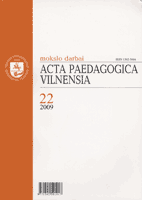POSTMODERNIOS MINTIES REIKŠMĖ ŠVIETIMO KAITAI
THE SIGNIFICANCE OF POSTMODERN THOUGHT FOR EDUCATIONAL CHANGE
Author(s): Lilija DuoblienėSubject(s): Education
Published by: Vilniaus Universiteto Leidykla
Keywords: postmodernizmas1; švietimas2; neapibrėžtumas3; ugdymo turinys4; tekstas5; autoritetas6;
Summary/Abstract: The article analyses educational challenges of the contemporary world from the perspectives of postmodern philosophy (Llyotard, Derrida, Rrorty, Foucault) and special philosophy of education (Parker, Eedwards, Uusher, McLlaren, Giroux, Ttrowler). Tthe investigation of present education from the postmodern perspective provides insights for better understanding of new educational problems and features. Rreliativizm and uncertainty, content ambiquity, ironic vocabulary and the loss of authorities are presented as most typical features of contemporary education. The discussed features make us create new doubts about education, question the meaning of education in general and its future prospects. The philosophy of education based on postmodernism, helps to understand all these fea¬tures as organic, natural features of contemporary world, helping us to clarify things and get rid of the doubts or just perceive them as unavoidable. The most of attention is given to the analysis of education as text and narrative (ludic postmodernizm approach). It opens new possibilities to understand irony and reflection in the word games. The analysis shows, how they are being played in education try¬ing to achieve ideological goals, so some education aspects are explicated from critical postmodernizm approach also.
Journal: Acta Paedagogica Vilnensia
- Issue Year: 2009
- Issue No: 22
- Page Range: 9-24
- Page Count: 16
- Language: Lithuanian

